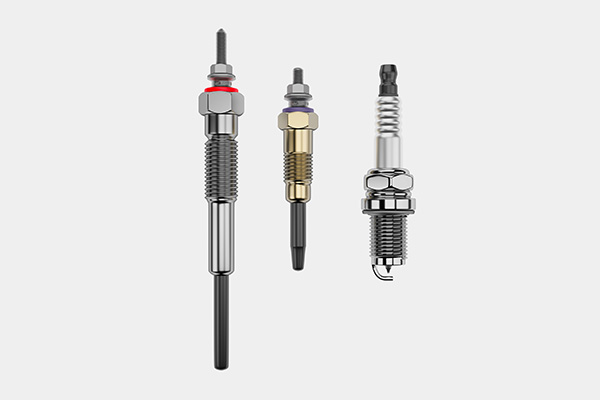
If you’ve driven both gas and diesel vehicles, you’ve probably noticed a few key differences in how they operate. One question that often comes up is: why don’t diesel engines have spark plugs? Since spark plugs are necessary for starting a gasoline engine, it might seem odd that diesel engines don’t use them at all.
To understand why, it helps to look at the fundamental differences in how diesel and gasoline engines create combustion and why diesel engines are designed to do things differently from the very start.
The Role of Spark Plugs in Gasoline Engines
In a gasoline-powered engine, air and fuel are mixed together in the intake system and then drawn into each cylinder during the intake stroke. Once inside, a spark plug ignites this mixture at precisely the right moment, triggering combustion that pushes the piston down and keeps the engine turning.
Without that spark, combustion won’t happen. This is why spark plugs are essential in gasoline engines. They need an outside source of ignition to burn the fuel-air mixture.
Diesel Engines Ignite Fuel Differently
Diesel engines, on the other hand, use a process called compression ignition. Instead of relying on spark plugs, they generate combustion through extreme pressure. Here's how it works:
Air is drawn into the cylinder and compressed by the piston to a much higher degree than in a gasoline engine. This compression raises the air temperature dramatically and makes it hot enough to ignite fuel without any external spark. At the compression peak, diesel fuel is injected directly into the combustion chamber, igniting on contact with the hot, compressed air.
This difference in combustion method is one of the core reasons why diesel engines are more fuel-efficient and better suited for heavy-duty applications.
What They Use Instead: Glow Plugs
While diesel engines don’t use spark plugs, many of them do use glow plugs—especially in colder climates or in smaller diesel engines found in passenger vehicles. Glow plugs are heating elements that warm up the air in the combustion chamber before the engine starts. This helps make sure the compressed air is hot enough to ignite the diesel fuel, particularly when the outside temperature is low.
Glow plugs are not used once the engine is running. They're strictly a cold-start aid and shut off after the engine reaches operating temperature.
Why the Difference Is Beneficial
The absence of spark plugs in diesel engines is part of what gives them their rugged reliability. Fewer components mean fewer points of failure. Diesel engines also produce more torque at lower RPMs, making them ideal for heavy towing, hauling, and commercial use.
But the flip side is that diesel engines must be built to handle much higher pressures. That means stronger components, more robust fuel systems, and in some cases, more expensive repairs when something does go wrong.
Do Spark Plugs Ever Belong in a Diesel Engine
No. Diesel engines are simply not designed to accommodate spark ignition. Trying to use a spark-based ignition system in a diesel engine would result in inefficient combustion or engine damage. Everything from the fuel injection strategy to the piston shape is built around compression ignition.
So, while glow plugs are sometimes confused with spark plugs due to their role in starting the engine, they serve a very different purpose and are not interchangeable.
Complete Automotive Repair Specialists – Diesel Engine Services in Cromwell, CT
At Complete Automotive Repair Specialists, we know diesel engines inside and out. Whether your vehicle uses glow plugs or a high-compression ignition system alone, our team has the tools and experience to keep it running at peak performance. From diagnostics to routine service and repairs, we’re here to help diesel drivers in Cromwell get the most from every mile.
Stop by today for expert diesel care you can trust.